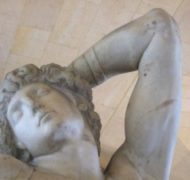The Big Picture
Blog / Produced by The High Calling
“Work to live, don’t live to work.”
These words were said to me when I was fresh out of school and several months into my first job. I was working long hours and throwing myself into my career with abandon. Not surprisingly, it wasn’t long before burnout ensued.
The well-meaning person who offered the above-mentioned advice obviously saw it coming. His attempt to caution me against such unbalanced living was well-founded…but was it sound?
According to John D. Beckett in this week’s reading of Loving Monday: Succeeding in Business Without Selling Your Soul, it is just this type of dualistic thinking that leads to dissatisfaction and dissonance between our work/faith roles. By implying that work is separate from living, my friend missed the mark. He missed the big picture.
That is just what John Beckett calls part two of his book: The Big Picture. In these pages Beckett examines the tap root that still nourishes modern Western culture regarding work and calling.
Beckett traces our current views of work and society back to ancient Greece.
The Greek thinkers, shunning the God of the Hebrews, came up with man-centered and mystical notions to define the world around them.
Aristotle, Protagoras, Socrates…these great minds eschewed the idea of a God-centered life-- encouraging man to rely on himself for wisdom instead. And then there is Plato. Plato, in an attempt to identify universal truths, gave us a first taste of dualism. He divided truth into two realms--form and matter. Form, the upper level, consisted of eternal truths. Matter, the lower, was temporal and physical.
Work was classified in the lower realm. Work to live…
Augustine fell prey to the same line of thinking nearly a thousand years after Plato’s model. He divided life into two categories: contemplative life--the higher realm--and active life--the lower. Once again work is relegated to the lower realm.
So where does this leave us? Are we to continue this dualistic line of thinking, just because it seems to be widely accepted?
Fortunately, Beckett says, modern thinkers offer a drastically different view. Beckett quotes Francis Schaeffer from his work A Christian Manifesto:
It is not only that true spirituality covers all of life, but it covers all parts of the spectrum of life equally. In this sense there is nothing concerning reality that is not spiritual.
A.W. Tozer, in The Pursuit of God, offers similar views:
One of the greatest hindrances to the Christian’s internal peace is the common habit of dividing our lives into two areas--the sacred and the secular. But this state of affairs is wholly unnecessary. We have gotten ourselves in the horns of a dilemma, but the dilemma is not real. It is a creature of misunderstanding. The sacred-secular antithesis has no foundation in the New Testament.
So much depends on perspective. Beckett concludes that when we choose a Biblical worldview as opposed to a Grecian worldview, everything we do will be either in harmony with God’s plan or in conflict with it. The big picture is this: there is no separating our different roles in life out from underneath the umbrella of God’s design.
I’m encouraged to read on, how about you? Next week we’ll discuss chapters twelve through fourteen as we begin Part Four: Applications.
Discussion Questions:
- Have you been affected by the dualistic worldview of life and business…which suggests that it is impossible to serve God by being business? If so, name one or two specific examples.
- Name two areas…in which you tend to have the worldview of dividing life into two areas--the sacred and the secular.
- In what way is dualism a hindrance to our internal peace and our effectiveness in life?
- Name three enduring qualities that are important to you. In what ways are these qualities challenged by what you encounter in your occupation?




